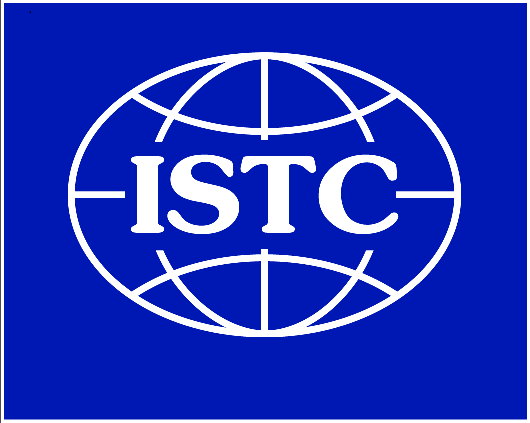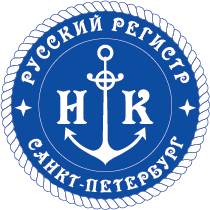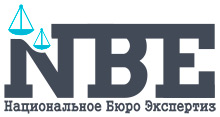NEWS AND COMMENTS
Declaring the transport of dangerous goods - an additional security guarantee...
Pre-shipment inspection of tank containers intended for the carriage of dangerous goods...
ISTC started training experts...
Preparation for the XIV International Conference "Multimodal Transport of Dangerous Goods"...
Training of specialists in a new quality...
"Sea Trade Port "Ust-Luga" JSC has successfully passed the certification audit...
IDGCA presents Russian version of the IMDG Code latest edition on disks...
An IMO circular does not define competency of national authorities...
XIII International Conference «Multi-modal transportation of dangerous goods»...
An IMO circular does not define responsibilities and authority of national organizations...
Report to the United Nations Economic Commission for Europe (UNECE) | 12.11.2019 |
|---|---|
|
International Dangerous Goods & Containers Association (further on – IDGCA) has represented the report about its activities to the United Nations Economic Commission for Europe upon the UNECE Secretariat request. The IDGCA consultative status in the TDG Sub-Committee of UN experts obliges non-governmental organizations to represent a report on the activities directed to development and application of the international rules and standards. In its report IDGCA presented the information about activities of training of the advisers on the transport of dangerous goods, activities of the expertise and consulting of business and administrative authorities. The report has been accepted with satisfaction by the UNECE Secretariat. | |
Development of offshore wind energy | 31.10.2019 |
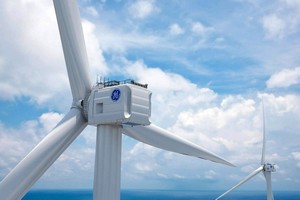
According to the Poland Sea portal, in 2040 renewable energy sources (RES) will become the main electricity supplier in Poland. According to power engineers, the necessary transformations in the power system and the security of energy supply can be achieved through the development of renewable energy sources. Particular attention in this direction is given to offshore wind power stations. The development of renewable energy sources, to a significant extent, can serve to reduce harmful emissions into the atmosphere. In Russia, wind energy is also becoming an integral part of the state’s energy strategy. | |
The ECE Board clarified the regulations on the import and export of narcotic drugs | 17.10.2019 |
|
The Board of the Eurasian Economic Commission specified the regulations on import and export of narcotic drugs, psychotropic substances and their precursors, as well as ozone-depleting substances and products containing them to the Eurasian Economic Union. Presentation of the license to the customs authority is not required from a member of the EEU, if:
| |
Report of the IMO SUBCOMMITTEE ON CARRIAGE OF CARGOES AND CONTAINERS (ÑÑÑ) 9-13 SEPTEMBER 2019 - 6th Session | 19.09.2019 |
|
The 6th session of the Subcommittee on the Carriage of Cargoes and Containers (CCC) was held from 09 to 13 September 2019. Three Working Groups (WG) and two Drafting Groups (DG) were formed and chaired as follows:
The following items on the agenda were also considered during the session: Particular attention was paid to the consideration of reports of incidents involving dangerous goods on ships and in port zones. The The Sub-Committee was informed that, of the 72,408 CTUs inspected, 5653 CTUs were found to have deficiencies, which means that 16.44% of the CTUs inspected were deficient, a significant increase from 8.38% for the previous year. Placarding and marking accounted for 57.12%, followed by securing/stowage inside the unit (16%) and marking/documentation (15.12%). The next meeting of CCC 7 is currently scheduled to take place from 14 through 18 September 2020. | |
New forms of transport documents on railways of the Russian Federation | 12.09.2019 |
|
On September 10, the Ministry of Transport of Russia published on its website Order of the Ministry of Transport of Russia ¹. 191 dated 19.06.2019 "About the Approval of Common Forms of Transport Documents for Transportation of Goods by Rail" (registered in the Ministry of Justice of Russia dated 06.09.2019 ¹. 55834). The order will come into force since September 10, 2020 and will repeal earlier existing order of Ministry of Railways of Russia dated 18.06.2003 ¹ 39 "About the approval of Rules of filling of transport documents for transportation of goods by railway transport" with the changes and additions. According to the experts of “IDGCA” NP transport documents should be properly studied by the participants of the transport process, in order to avoid delay of cargo on the railway. | |
September, 11 the President of IDGCA Moshkov Gennadiy Yurievich celebrates his birthday | 11.09.2019 |

September, 11 the President of IDGCA Moshkov Gennadiy Yurievich celebrates his birthday. Members of IDGCA and the staff congratulate Gennadiy Yuryevich on his birthday, wish him good health, family well-being and thank for the invaluable help and work he has been doing as the President of the International Dangerous Goods and Containers Association. | |
Many fires on containerships were caused by charcoal | 10.09.2019 |
|
According to TT Club, the number of fires on containerships in 2019 doubled - if in the previous twenty years on average such incidents occurred once every 60 days, now - once every 30 days. It is reliably known that charcoal was the culprit in most fires. Therefore issues of its transportation will be brought to the sixth session of the International Maritime Organization (IMO) Subcommittee on the Transport of Goods and Containers (CCC), which is taking place now in London (9-13 September). The subject was initiated by the German maritime authorities, who conducted a detailed investigation into two fires on ships. The most important point of discussion will be the Special Provision (SP925), which frees the transport of coal from strict regulations concerning dangerous goods. The German side 's proposal is that the International Maritime Dangerous Goods Code (IMDG Code) no longer allow the transportation of charcoal as "not dangerous." Likewise, additional steps regarding its loading rules will be discussed. The International Cargo Handling Coordination Association (ICHCA) and the insurance company TT Club agree that coal should always be transported as a dangerous good, and also consider it necessary to repeal a Special Regulation SP925. Note also that due to the increase in the number of fires on board container ships some transport companies - in particular, German giant "Hapag-Lloyd," South Korean company "HMM", Hong Kong company «Orient Overseas Container Line" (OOCL) - recently imposed fines on shippers for incorrectly declared dangerous goods. In order to detect violations, carriers introduce additional inspections of containers. Experts of "IDGCA" NP agree with the German side and believe that charcoal is a dangerous good, as it contributes to a number of risks in its transportation.
With reference to the above mentioned, it should be noted that proper declaration and inspection of charcoal is necessary and relevant. Such professional services are provided by "Russian Register" JSC, which is a 100% subsidiary of "IDGCA" NP. | |
Healthy competition is needed to develop Small and Medium Practices | 04.09.2019 |
|
On August 29, 2019, the meeting of the Government of the Russian Federation was held, chaired by Prime Minister Dmitry Medvedev and with the participation of Alexander Shohin, President of the «Russian Union of Industrialists and Entrepreneurs» (RSPP). At the Government meeting, Russian Prime Minister Dmitry Medvedev said that Russia has a national plan for the development of competition and adopted «road maps» for certain sectors of the economy. The Prime Minister expressed hope that at the autumn session the State Duma of Russian Federation will adopt draft of a bill on limiting the establishment of unitary enterprises. Earlier it became known that the Head of the Government of the Russian Federation approved an interdepartmental program for 2019-2023 to identify and suppress cartels and other agreements which limit the competition. Experts of «IDGCA» NP believe that agreements which limit the healthy competition can include the agreement concluded in 2017 between the Ministry of Transport of the Russian Federation and Federal Autonomous Institution «Russian Maritime Register of Shipping» («RMRS» FAU). It should be noted that such an agreement not only gave an unlimited advantage to the provision of paid services to «RMRS» FAU, but also to its numerous hidden structures, which officially and informally operate under the "roof" of «RMRS» FAU. Therefore, using the powers of «RMRS» FAU, transferred by the Ministry of Transport of the Russian Federation, these structures can easily displace their competitors from the maritime market. Such organizations include: the Certification Association «Russian Register» and its numerous private structures, «Marine Cargo Bureau» LLC , «Marine Engineering Bureau» LLC (Odessa city) and others. Thus, experts of «IDGCA» NP believe that damage to honest business can be caused not only by state monopolies, but also by their «journeymen», acquiring to themselves a special right to perform services in certain directions of activity. | |
Joint meeting of the RID Committee of Experts (RID) and the Working Party on the Transport of Dangerous Goods | 03.09.2019 |
|
The Informal Working Group on Inspection and Certification of Tanks has prepared proposals to amendments of Chapter 6.8 and subparagraphs 1.8.7 and 1.8.6 of the Model Regulations of the United Nations Recommendations on the Transport of Dangerous Goods, as well as those based on the Model Regulations of ADR, ADN and RID. The proposals will be submitted to the UN secretariat for discussion at the autumn session of the Joint Meeting of the RID Committee of Experts and the Working Party on the Transport of Dangerous Goods, which will be held in Geneva from 17 to 27 September 2019. Also at the session will be presented the report of the 12th meeting of the informal working group on inspection and certification of tanks, which took place in Madrid (Spain) from 10 to 11 July 2019, and other documents included in the agenda All documents of the session are available on the www.unece.org website. | |
IMO Subcommittee Meeting on Transport of Goods and Containers (CCC) 09-13 September 2019 - 6th Session | 02.09.2019 |

At the headquarters of the International Maritime Organization (IMO) in London, a regular meeting (6th session) of the Subcommittee on the Transport of Goods and Containers (CCC) will be held from 9 to 13 September 2019, in accordance with the agenda. According to the secretariat, the Subcommittee will continue its consideration of a number of codes, including the International Code of Safety for Ships using Gases or other Low-flashpoint Fuels (IGF Code), the International Maritime Solid Bulk Cargoes Code (IMSBC Code). The following will also be considered:
| |
The Government is concerned about the state of maritime transport. Development strategy | 02.09.2019 |
|
By Order of the Government of the Russian Federation ? 1930-r of August 30 2019, a new version of the Strategy for the Development of maritime transport of the Russian Federation until 2030 was approved. The new version of the Strategy, taking into account the current political and socio-economic situation in the country and the world, defines the priorities, goals and objectives of Russian maritime transport for the long term. The implementation of the goals and objectives of the national maritime policy defined by the new version of the Strategy will allow to strengthen Russian position among the leading maritime powers by 2030, to achieve sustainable development of the main directions of maritime transport. Source:www.government.ru | |
Documents for the transport of dangerous goods | 30.08.2019 |
|
One of the established international transport documents confirming that dangerous goods are properly marked, packed and laid in accordance with international and national requirements is the multimodal declaration for dangerous goods, which is applicable in all modes of transport. In 2004, in order to improve the safety of the transport of dangerous goods, the Ministry of Transport of the Russian Federation, by Order ¹ ÌÔ-34/195 of 23 March 1998, identified four organizations recognized in the field of the transport of dangerous goods, which, on behalf of shippers (cargo owners) and on the basis of the data provided by them, have the right to develop, register and issue declarations and certificates for dangerous goods. One of such companies is ZAO «Russian Register» JSC. (100% subsidiary of "IDGCA" NP). Unfortunately, currently unscrupulous companies have appeared on the market of expert services, which work under a foreign name and offer their expert services, without having the proper competence. Such declarations may provide to port authorities with unreliable information. In order to prevent forgery of declarations, «IDGCA» NP maintains a register and registration of all issued declarations and certificates for dangerous goods. Any official responsible for the safety of the transport of dangerous goods may, when applying to the IDGCA office verify the authenticity of the declaration. Having its trained representatives in many regions of the Russian Federation, «Russian Register» JSC performs inspection of cargo transport units and performs inspection of dangerous goods with issuance of a certificate of conformity, including confirmation of the information specified in the multimodal declaration. | |
Loading and unloading of dangerous goods in seaports and inland of water transport | 30.08.2019 |
|
On August 30, an examination of students trained in the training program «Loading and unloading of dangerous goods in seaports and inland of water transport» was held at the International Staff Training Center (ISTC). It was the 24th training group which was held in 2019. It is a good tradition of the center to report at training sessions and during the examination on key problems related to the work of the enterprises they represent and the specifics of their activities, which not only enrich the almost important information of ISTC teachers, but also allows to the center and to the secretariat of the International Dangerous Goods and Containers («IDGCA» NP) formulate proposals to improve the organization, technologies and procedures for the transport, loading and unloading of dangerous goods and containers. Graduates of the 24th Training Group of ISTC are presented for certification in IDGCA as advisers on safety of transportation of dangerous goods. IDCGA is the only public organization in the Russian Federation which has legitimate right to carry out certification of advisers on the basis of the Quality and Management Systems (SQS) registered in Federal Agency on Technical Regulating and Metrology (the certificate ¹ ROSS RU.I159.04OH00 of 27.12.2004). Besides training, ISTC is developing a multimodal declaration for dangerous goods and making inspections of cargo transport units with «Russian Register» JSC. | |
Joint Industry Guidance. The supply and use of 0,5 oil-sulphur marine fuel | 28.08.2019 |
|
A number of organizations, including the International Association of Oil & Gas Producers (IPIECA), the International Council on Combustion Engines (CIMAC), the International Association of Classification Societies (IACS) and the International Bunker Industry Association (IBIA), have developed a joint industry project - The supply and use of 0,5 oil-sulphur marine fuel. The guidelines provide recommendations to stakeholders in the field of ship fuel and shipping, from fuel mix manufacturers and suppliers to end-users. It presents specific safety and operational issues related to the supply and use of bunker fuels with no more than 0.50% sulphur content, an overview of fuel quality requirements and necessary controls to identify, prevent and/or mitigate safety concerns. The manual addresses issues such as fuel compatibility and stability, as well as fuel handling and storage. Provides a complete overview of existing operational factors that may affect safety. The guidance does not address compliance with flag State, port State or IMO regulations or guidelines or alternative means of conformity (e.g. exhaust gas purification systems), nor does it address the discussion of alternative fuels such as LNG, hydrogen or methanol. In addition to the guidance, an electronic training course will be prepared in October to understand MARPOL Annex VI and its potential impact on-board fuel use, as well as to raise awareness and address potential problems associated with it. Source:www.lloydslist.maritimeintelligence.informa.com | |
Sustainable shipping for a sustainable planet | 27.08.2019 |
|
This theme has been selected by the International Maritime Organization (IMO) as the World Maritime theme for 2020. This theme was proposed at the 122nd session, which was held at IMO headquarters in London from 15 to 19 July 2019, by Kitak Lim - Secretary-General of IMO. The year 2020 will mark the decade of the transition towards sustainable future for shipping industry, with the support of the IMO regulatory framework: the measures to cut greenhouse gas emissions and the reduce the sulphur content of ships' fuel oil has adopted, the Ballast Water Management Convention has been implemented to protect polar regions, the efficiency of shipping through the electronic exchange of information has been improved, the problem of digitisation of shipping has been solved and the rights of women in the maritime community have been enhanced. We remind that the Sustainable Development Agenda 2030 which has been adopted by world leaders in September 2015 and the 17 Sustainable Development Goals (SDGs) which were set out at the historic United Nations summit officially entered into force since January 1, 2016. | |
The Regulations for the transport of dangerous goods cannot be common | 26.08.2019 |
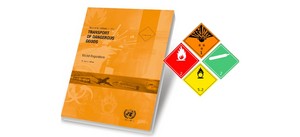
On August 22 2019 the website www.rzd-partner.ru has published an article entitled "The Regulations for the transport of dangerous goods should be general”. According to the experts of "IDGCA”, the article is hardly correct, including the title. The Regulations for the transport of dangerous goods cannot be common. There are goods classified as dangerous which, under certain conditions, cannot be carried by certain type (s) of transport. Meanwhile there is a baselined document- the Model Regulations of the United Nations Recommendations on the Transport of Dangerous Goods- which are the framework for developing regulations for the transport of dangerous goods by different mode of transport. The Model Regulations has been developed by experts of the United Nations Economic and Social Council since 1953. The author of the article refers to GOST R 57478-2017 "Dangerous goods. Classification, "which did not enter into force (see Order of the Federal Agency for Technical Regulation and Metrology of February 22, 2018 ? 93-rd "Amendments to the Order of the Federal Agency for Technical Regulation and Metrology of May 30, 2017 ? 454-th " Approval of the National Standard of the Russian Federation." In addition, it should be noted that, in accordance with the national legislation of the Russian Federation, GOST is a recommendation document, and any references to it are not correct. The author claims that in the European Agreement concerning the international carriage of dangerous goods by road there are no subclasses. But it is also hardly correct. They are (1 and 2 hazard classes). In this document( in the interpretation of the Model Regulations of the United Nations Recommendations on the Transport of Dangerous Goods) subclasses of 4, 5, and 6 classes of hazard are termed as classes, that is why in ADR there are 13 hazard classes rather than 9 as in the Model Regulations. The author 's reasoning about the chemical product safety certificate is very cloudy. The provisions of multinational standard GOST 30333-2007 “Chemical product safety passport. General requirements " are based on the provisions of the Globally Harmonized System of Classification and Labeling of Chemicals which is one of the supplements to the UN Recommendations on the Transport of Dangerous Goods and recognized in all leading countries, so that the content of the Russian Chemical Safety Passport and the foreign MSDS for the same substance should be related. Another thing is that these documents shall be developed by unscrupulous or not quite professionally trained "experts," but this is a different story. In addition, it should be noted that there are compatibility charts for each mode of transport, which can be used to determine which goods can be transported in one freight unit. It sounds like the author doesn't know that. The problem is probably not that there are no general rules (which actually cannot exist), but that there is no common understanding of existing rules both on certain modes of transport and on multimodal transportation. Taking this opportunity, IDGCA invites managers and specialists of enterprises engaged in transportation of dangerous goods and carrying out loading and unloading activities to receive training at the International Staff Training Center (ISTC). | |
The use of methanol on ships will be official confirm by next year | 26.08.2019 |
|
It the Hyundai Mipo Dockyard in South Korea, where the vessel-naming ceremony was held, took place the christening of two tankers co-owned by Swedish-owned Marinvest and Waterfront Shipping, Mari Couva and Mari Kokako. The two tankers have secured long-term charters with Methanex, the world’s largest methanol producer. Several shipowners have expressed an interest in investing in methanol-fuelled vessels. But most shipowners although are waiting on a regulatory update before committing any investments. The operations of such vessels are currently subject to the International Maritime Organization’s safety code for ships using gases or other low-flashpoint fuels, commonly cited as International Code of Safety for Ship Using Gases or Other Low-flashpoint Fuels (IGF Code), which began to apply on January 1, 2017. The IGF Code reflects the main directions of technological development of the industry, which reduce the level of environmental pollution and reduce the costs associated with the operation of ships. The adoption of the Code provided a technical opportunity for the unified use of natural gas as a motor fuel on ships. Responding to the evolving marine fuel market of new marine fuels, the IMO has drafted interim guidelines for the use of methanol and ethanol, which are expected to be confirmed in 2020. Owners of LNG carriers are among the first to adopt LNG as marine fuel. The same trend is repeated in the methanol market — the first cargo ships to burn this alternative fuel are designated to transport methanol. Many shipowners who have already chosen methanol as fuel have noticed clear cost savings. Some people have doubts that use of methanol and LNG will not deliver a halving of carbon dioxide from ship emissions, however, many count on it. Still, such bio-sourced fuels will have to gain confidence from the shipping community and maritime regulators. Source:www.lloydslist.maritimeintelligence.informa.com (translation of “IDGCA” NP) | |
Staff training of customs inspectors on dangerous goods | 23.08.2019 |
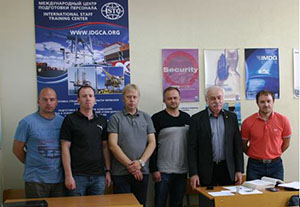
Within the period from 19 to 23 August 2019 the International Staff Training Centre (ISTC) has conducted a training course for the Baltic customs inspectors according to the “Safety conditions for handling, opening and inspection of cargo transport units which contains dangerous goods” The training course included both lectures and practical exercises, including an exit session at the port "Bronka". In the course of the questions asked by the listeners, there were those which could only be resolved at the Federal level. Graduates of the course, who successfully passed the final examination on August 23, are presented for certification in "IDGCA" NP as inspectors on dangerous goods. The results of training course showed full satisfaction of inspectors with its content, efficiency, organizational support and work of teachers. | |
New Architecture of Freight Transport in Russia | 21.08.2019 |
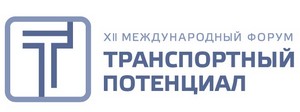
On September 12-13, 2019, the XII International Forum "Transport Potential" will be held in St. Petersburg. The event will be held with the support and participation of the State Duma of the Federal Assembly of the Russian Federation, the Ministry of Transport of the Russian Federation, the Eurasian Economic Commission, the Ministry of Industry and Trade of the Russian Federation, the Federal Customs Service of the Russian Federation, Russian Railways JSC and other relevant departments developing and implementing state policy in the field of transport. The two-day business program will address the development of freight transport of railway, road and water transport. Much attention will be paid to the problems of regulatory and legal support of cargo transportation, prospects for the development of the logistics services market, tariff policy, customs regulation issues, opportunities to improve conditions for uninterrupted international transport of goods and many others. The main outcome of the Forum will be a Resolution with proposals of participants, which will be sent to the authorities to improve the sectoral legislation. Representatives of "IDGCA" NP are active participants of this forum. More information about the forum can find at forumrtp.ru | |
The professional standard “Stevedore” | 20.08.2019 |
|
The Ministry of Labour and Social Protection of the Russian Federation issued Order ?. 507n of 18 July 2019 " Approval of the Professional Standard" Stevedore. " The purpose of the stevedore activity, according to the standard, is to carry out safe loading and unloading in the port. To take up the position of stevedore, secondary vocational education will be required under a specialized training program conducted at least once every five years, or higher specialized education (bachelor 's degree). Refer obligatory preliminary, periodic and extraordinary medical examinations (inspections) to special conditions of admission. It will be necessary to undergo training in safe methods and techniques of work, training in labor safety, training in the workplace and testing of knowledge of labor safety requirements. At the same time for the position "stevedore" the standard does not impose requirements to work experience. For the position of "major stevedore," there is a requirement of at least one year in the position of stevedore. The International Staff Training Centre (ISTC). provides training courses on the transport and handling of dangerous goods in different modes of transport. The training is based on the study of international conventions, rules and standards, as well as the national legal framework in this field. Upon successful completion of the training, students are issued with advanced training certificates, and graduates of courses who have passed the final examination of the International Dangerous Goods and Containers Association receive certificates of advisers on the safety of the transport of dangerous goods, followed by posting of the relevant data on the IDGCA website. | |
INTERNATIONAL STANDARD FOR SAFETY SIGNS UPDATED | 20.08.2019 |
|
The International Organization for Standardization. (ISO) Updated its technical standard ISO 7010 for Graphical symbols — Safety colours and safety signs, including signs marking emergency exits. ?s of August 2019 the latest version is ISO 7010:2019. The standard includes all previous amendments, as well as water safety signs and beach safety flags previously specified in ISO 20712 (which has been canceled). The standard differs from the Globally Harmonized System of Classification and Labelling of Chemicals established by the United Nations for standardization of classification and labelling of hazardous materials. ISO 7010 prescribes safety signs for accident prevention, fire protection, health hazard information and emergency evacuation. ISO 7010 was developed by ISO subcommittee ISO/TC 145/SC 2, Safety identification, signs, shapes, symbols and colours, the secretariat of which is held by DIN, ISO’s member for Germany. | |
Transparency during transaction of petrochemicals | 15.08.2019 |
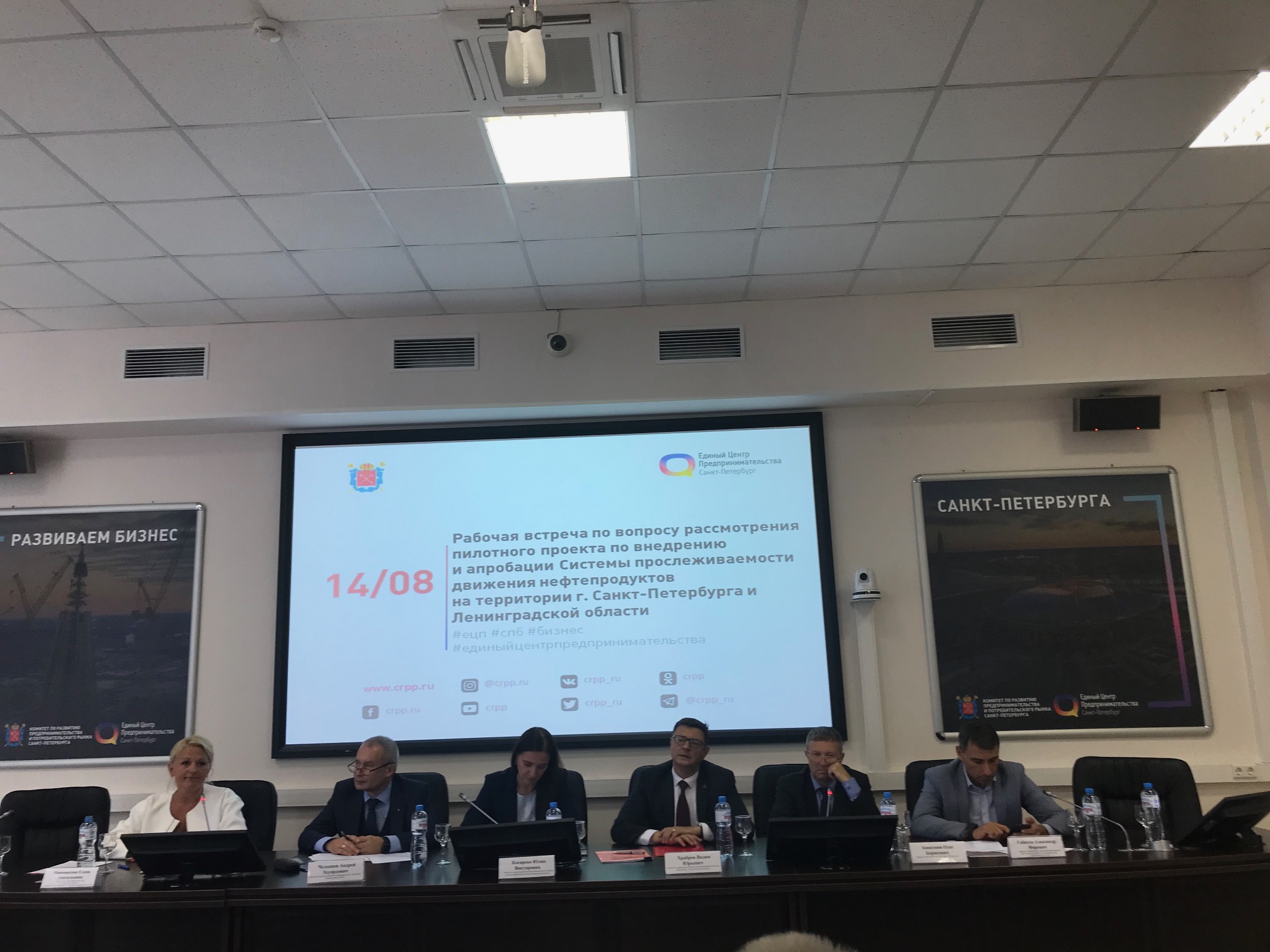
A working meeting was held in the Unified Entrepreneurship Center (St. Petersburg) affiliated with representatives of the Governments of St. Petersburg and Leningrad Region with the participants of the market of St. Petersburg and Leningrad Region to consider the pilot project of the Information System of monitoring transaction of petrochemicals în àugust, 14. The relevance of the meeting is due to the fact that "black" and "grey" markets of petrochemicals, unfortunately, occupy a place in the total volume of transaction of these vital energy supplies for the economy of the country and its population. There are cases of sale of surrogate goods, fraudulent actions to obtain illegal profit, manipulation by changing the density of petrochemicals, etc. A great part of petrochemicals are dangerous goods of the third class of danger (Class 3 (flammable liquids)), many of them are "goods of the increased danger" (goods that can be used for terrorist purposes). The Vice-President of NP "Oil Club of St. Petersburg" Andrei Miheev discoursed the presentation concerning the mentioned problems and the proposed ways to solve them. As a result of the discussion of the agenda issues, it was decided to continue work on the creation of the Information System of monitoring transaction of petrochemicals. Deputy Director General of the International Dangerous Goods and Containers Association, Director of the International Staff Training Center (ISTC) Tsikhiseli V.G. took part in this meeting. | |
Fines for undeclared dangerous goods | 13.08.2019 |

Evergreen, transport operator, has told clients that it fines of $35,000 per container would be imposed for hiding information about dangerous goods or incorrectly declaring dangerous goods. This is the largest amount of fine declared by the lines to date. According to the Cargo Incident Notification System (CINS), nearly 25% of all serious incidents aboard container ships involve incorrectly declared cargo. In 2019, there were a large number of maritime incidents than in 2018. At the same time, in most cases, the causes of the incidents were established as incorrectly declared goods. Earlier plans to fine undeclared or incorrectly declared dangerous goods announced OOCL and Hapag-Lloyd. Maersk and HMM also intend to introduce similar measures. Container carriers will strengthen the rules for the acceptance of dangerous goods and the inspection of containers by conducting additional inspections before loading. The costs of incorrectly presenting the goods for carriage will be borne by the shipper. The new system of fines will enter into force on September 15, reports the Splash24/7. The dangerous goods declaration – is the international transport document provided by the consignee who certifies that the cargo can be accepted for shipment and that it is properly packed, marked and supplied with signs of danger and is in a due state for transportation according to the international and national rules of transportation of goods. The best way is to trust professionals to avoid unacceptable mistakes and fines. “Russian Register” CJSC has been developing and issuing declarations for the transport of dangerous goods since 2004 and has established itself as a competent organization in this area. "Russian Register" CJSC provides a complex of services related to the transport of dangerous goods, including inspection of the laying and placement of goods on vehicles, verification of compliance of cargo packaging with transportation conditions, certification of containers in a voluntary certification system, services on cargo support and registration of permit documents. The field of declaration of dangerous goods requires not only special knowledge and special tools in the form of national/international regulations and standards, but also a lot of experience. | |
Results of the Meeting at the Ministry of Transport | 09.08.2019 |
|
On August 7, 2019, the Department of Development Programs of the Ministry of Transport of the Russian Federation will hold a meeting on the issue of analyzing the methodology for conducting research on the target state of priority services for paperless carriage of goods by road for the implementation of the Super Service “Paperless transport of passengers and cargoes”. At the meeting, a presentation on the development of Super Service was presented. Super services are another feature of the state services portal. When they begin to work in full, the services themselves will remind themselves. Super services are planned to be opened as a platform for business. What can be done with the help of super services? To draw up euro protocol - to document a road accident; Digital enforcement - to know about debts and proceedings; Justice - online bringing a case before the court; Lodging complaints with the law-enforcement authorities - to write an application on a crime, send it online; Disability assistant - to send applications for necessary services, request a medical note; Labor relations - to register an electronic workbook, to see data on employer deductions to pension and other funds; Social assistance - to send a request for payments; Pension benefits - to calculate the pension, to determine the way to receive it; Labor migration – to get a patent, to apply for a visa, to check the employer, to pass exams; Admission to the university – to compare universities, to apply for admission online; Digital documents on education – to receive online documents on general, secondary vocational and higher education; Education in Russia – to apply and pass the selection for admission to universities of the Russian Federation; Land for construction - to conclude a contract of sale, lease or gratuitous use of land with natural or legal entities; Digital construction - to create an object of capital construction from design, examination and construction to state examination of rights to a real estate object; Healthcare - to draw up OMI policy, to make an appointment with a doctor; Registration of violations of traffic rules and improvement rules - to record a violation of traffic rules or improvement rules using a Smartphone; Passport services - to apply for registration at the place of residence; Notification and appeal of fines - to know if you have any fines, to pay them; Digital business permissions - to get all the necessary licenses and permits for entrepreneurial activity; Government support of business - to receive a soft loan or other type of state support; Registration of a business - get all the documents for registering an enterprise; Paperless transportation of passengers and goods - to draw up documents for cargo or passengers in automobile transport online; Birth of a child - to make an appointment with a doctor, to choose a maternity hospital, to apply for benefits and maternity capital; The loss of a loved one - assistance in organizing farewell and funerals, registration of guaranteed and insurance payments; Moving to another region - to register at a new place, to get an OMI policy and to attach to a polyclinic, to receive personal housing and utility bills, to enroll a child in a kindergarten or school, to register with the military enlistment office; | |
Is it possible to reduce the risk of losing containers at sea? | 08.08.2019 |
|
The container ship KOTA WANGSA (IMO 9123594, Singapore flag) lost 17 containers during a sailing from Chittagong to the ports of the Strait of Malacca, fleetmon.com reports. The cause of the incident was difficult weather conditions. The contents of the containers are not reported. How many containers with cargo in the world annually fall overboard, it is not known, there are no clear statistics, but companies carrying goods, as well as cargo owners, are interested in publishing accident reports. The United States National Oceanic and Atmospheric Administration (NOAA) estimates that 6 million containers are in circulation in the World Ocean per year, and 10,000 of them fall overboard each year. The size of the vessel does not affect the likelihood of such incident: the container may fall from both a small-capacity and a large-capacity vessel. If the vessel is small, there is a high risk that the container will be washed overboard by a high wave. If the vessel is large – a great inertia force acts on the cargo during acceleration or rotation, as a result of which the container falls from the deck. Sometimes the containers have bad fixation or improper alignment, but more often case is when the fastening means just break. Often the cause is the specifics of the cargo transported in the container and miscalculations in estimating the weight of the containers during loading. Losing containers is a threat for many reasons. From time to time ship-owners report that they touch half-sunken containers with the ship’s hull, which often leads to accidents. Of particular danger are containers with dangerous goods. For example, in November 2014, a container fell from the board of a US Navy warship containing a helicopter propeller blade with a radionuclide-based device – strontium 90. The incident occurred in the western Indian Ocean. Due to the great depth, it was not possible to lift the container from the bottom. Strontium 90 is a dangerous radioactive substance that causes bone marrow cancer in humans. However, the US Government issued a statement that the container does not threaten either people or nature, but is it really so?! In February 2010, three containers fell overboard in the Baltic Sea at once. One of the containers contained five tons of flammable substances and fifteen tons of substances hazardous to the environment. Finding a drowned container in the sea is really not easy. There were projects on equipping containers with dangerous goods with signal beacons, which would greatly facilitate their search. Projects did not gain popularity because they demanded costs from cargo owners. Today, labeling of containers and their proper handling continues to be a problem. Increasingly, there are cases of loss of containers with dangerous goods, as they are usually located on the upper tiers of the deck. And the process of lifting the container from the bottom of the sea is an expensive operation. Experts of International Dangerous Goods and Containers Association (“IDGCA” NP) believe that the human factor is important in solving this problem. It is possible to reduce the risks of losses if the rules are followed and correct actions are taken during packaging, loading, placement and securing of goods, as well as by appropriate calculations. It is possible to reduce the risk of container loss by attracting professional surveyors to inspect the cargo and secure it. “Russian Register” CJSC specializes in the field of cargo placement, stowage and securing on board, which helps to prevent or minimize risks during cargo transportation. | |
Passenger and cargo transportation without paper documents | 06.08.2019 |
|
On August 7, 2019, the Department of Development Programs of the Ministry of Transport of the Russian Federation will hold a meeting on the issue of analyzing the methodology for conducting research on the target state of priority services for paperless carriage of goods by road for the implementation of the Super Service “Paperless transport of passengers and cargoes”. The meeting will be attended by General Director of “IDGCA” NP, M.I. Ognev, and Deputy General Director of “IDGCA” NP – Director of ISTC V.G. Tsikhiseli. Recall that the project of Super Service “Paperless transport of passengers and cargoes” was presented in July by the Ministry of Transport of the Russian Federation. The project provides for online execution of documents for cargo transport by road and should start its work in our country until 2024. The development and implementation of the project, and seven other similar state super-services, are provided for by the national program “Digital Economy of the Russian Federation”. | |
Scrapping of ships requires special attention | 05.08.2019 |
|
Three workers died and six were poisoned by a toxic gas leak aboard a tanker which was under ship-breaking at the Chittagong shipyard in Bangladesh, World Maritime News reported. A gas leak occurred due to pipe damage in the engine room of “Medelin Atlas” ship. In developing countries, ship-breaking takes place on unequipped shores, where (especially on older ships) asbestos, lead, polychlorinated biphenyls and heavy metals, as well as other cargoes classified as dangerous, pose a danger to people. Burns from explosions and fires, asphyxiation, injuries from falling metal and illness from toxins are usual for this industry. When cutting the ship’s hull, high-temperature acetylene-oxygen burners are used. In this regard, there are constantly evaporating burning materials and harmful substances in the air. All this causes serious dangers and potential risks for workers. In developed countries, means of protection from harmful dust and fumes, as well as expensive insurance make the procedure of ship-breaking economically unprofitable. The cost of scrap metal obtained by cutting the ship's hull does not justify the costs incurred. However, in the developing world, ships recycling plants remain profitable, since their owners do not spend money on protecting workers, and those, in conditions of general poverty, agree to work in life-threatening conditions. Moreover, the protective means used are insufficient or even absent. According to reports from local regulatory authorities in Bangladesh, one worker dies weekly during ship-breaking of old ships, and on average one worker is seriously injured daily.Experts believe that, despite the developed national and international standards, for example, ISO 30000:2009 standard “Ships and marine technology. Ship recycling management systems. Specifications for management systems of enterprises for the safe and environmentally sound recycling of ships”, safety issues in ships recycling do not receive a sufficient attention from the point of view of labor protection. | |
Model Regulations - Twenty-first Revised Edition | 30.07.2019 |
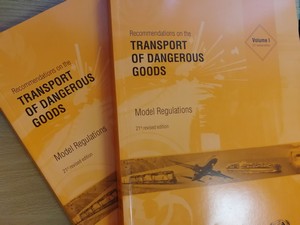
The Committee of Experts on the Transport of Dangerous Goods of the United Nations Economic and Social Council has released an electronic version of the 21st edition of the UN Model Regulations.on the Transport of Dangerous Goods. The Model Regulations in electronic form are available in 3 languages: English, German and French. The scope of application of the Model Regulations is intended to ensure their usefulness to anyone who is directly or indirectly involved in the transport of dangerous goods. Experts of “IDGCA” NP use in their work exclusively updated versions of international documents and standards. This year, the library of “IDGCA” NP was replenished with a new 21st edition of the UN Model Regulations. Vol.1 Vol.2 | |
Safe conditions for the work of the Customs with dangerous goods | 29.07.2019 |
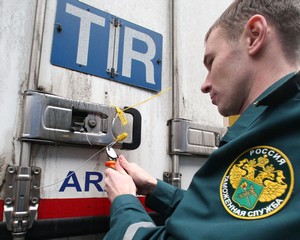
Most of the international and national regulations in the field of dangerous goods turnover determine the requirements for enterprises and organizations involved in preparation for transportation, transportation, loading and unloading of dangerous goods on all types of transport. Chapters 1.3 of the Model Regulations of the UN Recommendations on the Transport of Dangerous Goods, as well as all documents based on the Model Regulations (IMDGC, ADR, ADN, RID, Annex 2 to the Agreement on International Goods Transport by Rail) specify that persons transporting dangerous goods must be trained accordingly with their responsibilities in the area of dangerous goods requirements. But currently there are no requirements for the training of civil servants in this field. This issue has been repeatedly discussed by experts on the transport of dangerous goods of the International Maritime Organization (IMO) and of the UN ECOSOC, but no mandatory requirements have been developed. However, the supervisory authorities gradually come to realize that their officials should be trained not only in the performance of their direct functions in the field of cargo inspection, but also in the requirements for safety and labor protection when working with dangerous goods, including the requirements for opening cargo transport units , in order to avoid accidents. The International Staff Training Center (ISTC) has developed special programs for the training of inspectors of supervisory bodies, depending on their functional duties and official position. Representatives of the State Maritime and River Supervision of the Federal Service for Supervision of Transport have already been trained under this program. The next courses on “Safety Conditions for Processing, Opening and Inspection of Cargo Transport Units” program will be held in August for representatives of the Baltic Customs, which the ISTC has recently signed a government contract with. | |
Serving the favorite cause | 19.07.2019 |

July 19, Deputy Director General of the International Dangerous Goods and Containers Association, Director of the International Staff Training Center (ISTC), Vladimir Gerontievich Tsikhiseli, celebrates his anniversary. Vladimir G. Tsikhiseli connected most of his life with the Armed Forces, having received the first shoulder marks of a pupil of Suvorov Military College in 1964 at the Caucasian Suvorov Military College (in the city of Ordzhonikidze, now Vladikavkaz). He graduated in the Military Engineering Academy named after A.F. Mozhaisky. From 1972 to 2002 he served at the Plesetsk launching site, and then at the Military Space Academy named after A.F. Mozhaisky. He was awarded several government awards; the author of more than 90 scientific and methodical works, including 25 inventions, has medals of the USSR Exhibition of Economic Achievements; candidate of Technical Sciences, Associate Professor of the Department of Thermodynamics and Cryogenic Engineering; Academician of the International Academy of Refrigeration; retired Colonel. He graduated from military service as a head of the Department of cryogenic equipment and filling equipment of Military Space Academy named after A.F. Mozhaisky. In 2003 he headed the ISTC; he is a Scientific Secretary of the Expert Council of IDGCA; a repeated participant in the sessions of the UN ECOSOC Committee of Experts on the Transport of Dangerous Goods and on the Globally Harmonized System of Classification and Labeling of Chemicals, as well as an expert of the ISO/TC 220 technical committee for cryogenic vessels of the International Organization for Standardization. Over the years, he has trained thousands of specialists in various specialties, including in the field of the transport of dangerous goods. The quality of training is so high that many large enterprises periodically send their specialists for an advanced training to the ISTC. Possessing the best personal and business qualities, Vladimir Gerontievich leaves the most positive impressions on people who have been trained at the International Center. The whole territory of Russia and the countries of the former Soviet Union is the geography of his students. The recognition of his professional qualities comes not only from the students of the ISTC, but also from thousands of former cadets, who are military professionals now, and from the leaders of various enterprises, who studied at the Academy n.a. A.F. Mozhaisky. Vladimir Gerontevich accumulated his experience not only from scientific literature, but also from practical activities during his service at the Plesetsk launching site and at other facilities. On his anniversary, Vladiminr Gerontievich is full of new aspirations and ideas for the development of the International Staff Training Center. The President, the Director General, the employees, and the members of the International Dangerous Goods and Containers Association congratulate Vladimir Gerontevich on his anniversary and express gratitude for many years of noble work, wish him good health and long years of work in IDGCA for the benefit of progress! | |
PLESETSK celebrates its anniversary | 16.07.2019 |
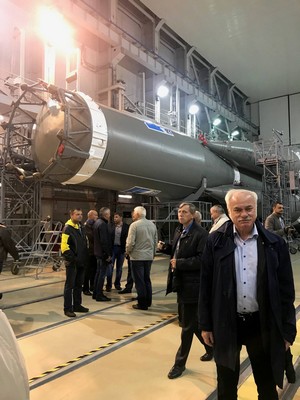
Ceremonial events dedicated to the 60th anniversary of one of the oldest sites for space-vehicle launching were held at the 1st State Test Space-Launch Complex of the Russian Federation in Plesetsk. PLESETSK launching site is the northernmost and one of the largest launching sites of the world, providing part of Russian and international space programs related to commercial, as well as applied, scientific and defense launches of unmanned space vehicles. The history of the Plesetsk launching site begins on January 11, 1957, when a decision of the USSR Government to create an object with the code name Angara was adopted. Initially, it was a compound of missile regiments armed with intercontinental ballistic missiles R-7, the development of which was conducted under the guidance of Academician S.P. Korolyov. When in the early 60s of the last century it became necessary to expand the space activity, it was decided to use the launch complexes built in Plesetsk for launching space vehicles. On March 17, 1966 at 13 hours 28 minutes the first such launch took place. Currently, works with the carrier rockets of the light class “Angara-1.2”, “Soyuz-2.1v”, “Rokot”, the middle class “Soyuz-2.1a”, “Soyuz-2.1b”, and the heavy class “Angara -A5” are carried out at the launching site. The celebration gathered hundreds of veterans of the launching site from different regions of Russia. After the ceremonial lining-up of the personnel, the veterans visited the main facilities of the complex: the assembly and test building, where the preliminary preparation and assembly of the missiles is carried out, and the launching facility. The veterans were awarded commemorative medals and souvenirs. The attention paid by the Government of the Russian Federation to the development of the launching site in Plesetsk instills confidence in the continuation of the rich traditions of Russian cosmonautics. The retired colonel and the director of the International Staff Training Center (ISTC), Vladimir G. Tsikhiseli, took part in the celebration. Soon he will also celebrate his anniversary. | |
The management system has failed | 15.07.2019 |
|
At the beginning of June the baggage dispensing has become a great problem for passengers of the Sheremetyevo Airport in Moscow. The press service of the airport reported that the situation will stabilize by the end of June. On June 5, the Ministry of Transport of the Russian Federation promised to respond harshly to the situation if it is not normalized as soon as possible. On June 29 and 30 again a large amount of baggage (about 9 thousand units) was not sent to its destination. Also, about 1.5 thousand units of baggage have accumulated in Sheremetyevo due to late flights caused by high thunderstorm activity. In addition, there were technical problems at the terminal D - the baggage tape did not work for about 30 minutes. On June 28 the aircraft parking place at terminal B of the airport was flooded with water. In July 2019, a number of managers of “Sheremetyevo Handling” LLC were dismissed. It is noted that a similar situation was observed in 2018. At the same time, in July 2018, Sheremetyevo International Airport passed the recertification of the quality management and environmental management system according to the new versions of MS ISO 9001:2015 and 14001:2015 standards and the management system in the field of industrial safety and labor protection for compliance with the international OHSAS 18001: 2007 standard. Such serious certification should guarantee high quality of services; however, the opposite is true. Experts of the International Dangerous Goods and Containers Association believe that the certification of the quality management system, with the existing practice, has a formal nature, and is expressed in the form of issuing a “well done” paper. It takes a lot of money and time to receive such documents; this money could be invested in the purchase of new equipment, personnel training and management system improvements. According to Sheremetyevo Airport, the certification of the airport’s quality management system was carried out by “Russian Register” Certification Association. Thus, not only the aircraft parking was damaged by water, but also the reputation of the certification body was damaged by this case. | |
Staff training for LNG terminals | 09.07.2019 |
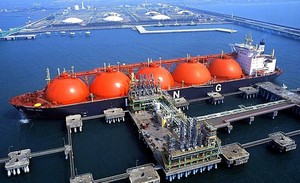
The International Staff Training Center (ISTC) has launched a new training program for specialists who operate equipment for liquefied natural gas terminals The program takes into account the requirements and recommendations of national legislation, as well as the International Maritime Organization (IMO), the Society of International Gas Tanker and Terminal Operators (SIGTTO), the International Group of Liquefied Natural Gas Importers (GIIGNL), the Oil Companies International Marine Forum (OCIMF) and other specialized international organizations. The program pays special attention to studying the requirements for maritime operations conducted during the transportation and transfer of cargo in port, and the order of ship-to-shore interaction. Recently, in Vyborg, this program was successfully completed by employees of one of the organizations that are part of “GAZPROM” PJSC. Staff training will be conducted on an ongoing basis upon as and when the groups are formed. The International Staff Training Center has a license to carry out educational activities ? 1734 dated February 20, 2016, is certified by the international certification body DNV GL in the provision of additional vocational education services, and also complies with ISO 9001:2015 standard, “Quality Management Systems. Requirements”. | |
The installation of GLONASS was proposed to be postponed | 03.07.2019 |
|
The Ministry of Transport proposed to suspend the installation rules for GLONASS or GLONASS/GPS navigation equipment until May 31, 2020. The project proposing to postpone the entry into force of the rules for installing navigation equipment on vehicles carrying dangerous goods is under public discussion. Previously, these rules were already suspended until July 1, 2019 due to the lack of equipment on the market. The current proposal to postpone, as indicated in the explanatory note to the draft Decree, is connected with the absence in the legislation of the requirements that the information transmitted through this system is not subjected to correction. In addition, it is not indicated that this equipment is a measurement instrument. Under existing conditions, the data transmitted by such equipment cannot be legally relevant and cannot be used against violators. Source:www.4dk.ru | |
Rules for the transportation of container-trailers | 03.07.2019 |
|
The Ministry of Transport of the Russian Federation has developed the first Rules regulating transportation of container-trailers. Now it is regulated by the obsolete order of the Ministry of Railways of Russia "On Approving the Rules for the Transport of Automotive Vehicles". Currently, the draft order has already passed a stage of public discussion and has been sent for independent anti-corruption expertise. Source:www.trans.ru | |
The explosion in the Turkish port | 02.07.2019 |
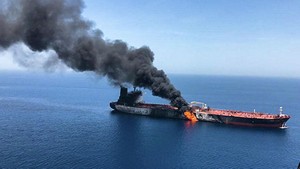
On July 1, 2019 at the Petkim terminal (Aliaga port, Izmir Province, Turkey) an explosion occurred during the injection of liquefied petroleum gas on the Italian tanker Synzania. The fire was promptly extinguished, but 16 people were injured, one died. The causes of the incident are being investigated. Source:www.ria.ru | |
Plan of restrictions on sulfur | 02.07.2019 |
|
The Singapore Shipping Association (SSA) has published the Preparedness Plan For IMO Requirements on Maximum Permissible Sulfur Levels 2020 to prepare the country's shipping industry for new restrictions on emissions of sulfur oxides from ships. The document gives an overview of the basic requirements for sulfur content in bunker fuel, describes the main preparatory stages before January 1, 2020, and presents the main measures and recommendations for ensuring compliance with new standards for bunker fuel. Source: www.shipandbunker.com | |
ISTC expands staff training program | 28.06.2019 |
|
The International Staff Training Center (ISTC) has developed a new training program for specialists involved in the loading and unloading of liquefied natural gas. The program includes a study of the requirements for handling mooring lines. Next week, the first group of specialists trained in a new direction will have field classes in Vyborg. | |
55th Session of the UNECE Subcommittee of Experts on the Transport of Dangerous Goods (TDG Subcommittee) | 26.06.2019 |
|
The 55th session of the UNECE Subcommittee of Experts on the Transport of Dangerous Goods and the 37th session of the Committee of Experts on the Transport of Dangerous Goods and the Globally Harmonized System of Classification and Labeling of Chemicals will be held from 1 to 5 July, 2019 in the Palais des Nations (Geneva). The provisional agenda for the session is available at www.unece.org Russian version of the agenda (translation of “IDGCA” NP) “IDGCA” NP experts will take part in the session. Upon completion of the session, information on the outcome of the session will be posted on “IDGCA” NP website. | |
Freight inspection of heavyweights | 26.06.2019 |
|
When insuring cargo, insurance companies attract surveyors and inspection organizations to reduce the risk of occurrence of insurance cases. Loading and unloading of heavyweights and their transportation are complex and very demanding operations; therefore, highly qualified surveyors with professional knowledge and experience should be involved in inspections.“Russian Register” Closed Joint Stock Company (a subsidiary of “IDGCA” NP) recently conducted an inspection of a cargo unit weighing 380 tons. Cargo delivery was carried out by several types of transport, including sea and river routes, and was successfully completed."Russian Register" CJSC performs survey and inspection works of high complexity since 2002, and has established itself as an independent company with an impeccable reputation. | |
The development of multimodal transport | 26.06.2019 |
|
At the 23rd St. Petersburg International Economic Forum (SPIEF), which was held from 6 to 8 June, “TransContainer” PJSC and the Government of the Kaliningrad Region concluded an agreement on cooperation in the framework of the project for the construction of a transport-and-logistics center (TLC) on the territory of the Chernyakhovsk industrial park. The TLC in Chernyakhovsk is intended for transshipment of transit containers from the Russian standard rail gauge (1,520 mm) to the European rail gauge (1,435 mm) and inversely. The processing capacity of the TLC should be at least 500 thousand TEU (equivalent to a twenty-foot container).“TransContainer” PJSC has concluded agreements with COSCO SHIPPING on the creation of a joint venture. The companies intend to offer each other competitive rates for transportation, mutually use the container fleet, develop multimodal services and attract new cargo flows. | |
101st Session of the Maritime Safety Committee (IMO) | 25.06.2019 |
|
From 05 to 14 June 2019, the 101st session of the Maritime Safety Committee of the International Maritime Organization (IMO) was held. The Committee adopted amendments to the International Convention for the Safety of Life at Sea (SOLAS), the international IMO codes, as well as a number of recommendatory resolutions and circulars. The session continued the discussion of approaches to the international legal regulation for autonomous maritime surface vessels (AMSV). The Committee will continue to pay attention to important issues during its upcoming sessions in 2020 and 2021 regarding measures to respond to possible threats to vessel safety when using new fuels. The next 102nd session of the Maritime Safety Committee is scheduled for May 2020. | |
It is the International Day of the Seafarer today | 25.06.2019 |
|
In 2010, the International Maritime Organization (IMO) decided to celebrate the International Day of the Seafarer on June 25th. It is worth noting that the date set is dedicated to the work of seafarers. Its main goal is to acquaint the world community with the pressing problems of people of maritime professions. After all, thanks to the great contribution of people who have linked their lives with the sea, world trade, the economy and all of civil society as a whole receive additional development. This year, the International Maritime Organization urges the public to empower women who have linked their lives with work at sea. “IDGCA” NP congratulates all seafarers of civil specialties, both active and retired, on their professional holiday – International Day of the Seafarer. | |
| URALCHEM will increase the production capacity for calcium nitrate | 03.06.2019 |

URALCHEM, JSC starts a large-scale project, in the framework of which it plans to increase the volume of calcium nitrate produced. Expansion of the production capacity will be held in the branch of KChKK, Kirovo-Chepetsk. According to the project, the existing capacity for the production of calcium nitrate, which is 135 thousand tons per year, is planned to increase by 93 thousand tons. For these purposes, a new production complex will be built at the plant. The estimated launch date is the end of 2020. Calcium nitrate concentrated is the flagship product in the line of water-soluble SOLAR fertilizers, which was developed as part of the import substitution program. It contains at least 98% of calcium nitrate as a chemical compound, which is more than in similar products from other global manufacturers. It is widely used in agriculture as a fertilizer, in the oil and gas industry as a raw material in the production of well-killing solutions, as well as a component of emulsion explosives and an anti-frost additive for concrete in construction. Source: www.uralchem.ru | |
| Two new trains of «TransContainer» | 03.06.2019 |

A container train was launched on the route Zibo (Chinese Province Shandong) - Yekaterinburg (Sverdlovsk Railway) through the Zabaykalsk border crossing. The first train left China on May 22 and arrived at the destination station on May 30. Time en route decreased, compared with single shipments and was 8 days. The railroad train included containers with household appliances, a total of 134 TEU. Scheduled trips of trains on a new route are planned on a regular basis. The new service allows customers to reduce the time and cost of delivery of goods. In addition, on May 30, the first container train to Ugolnaya station (Far Eastern Railway) departed from Bezymyanka station (Kuibyshev railway). The train was carrying consumer goods produced in the Samara, Penza, Orenburg regions, as well as in the Republic of Tatarstan, with a total amount of 68 TEU. Source: trcont.com | |
| Chief of "Dangerous Goods and Road Safety Management Section" | 28.05.2019 |

Mr. Romain Hubert will start working as Chief of “Dangerous Goods and Road Safety Management Section” from 1 June 2019. In that capacity he will undertake Secretariat of the following bodies:
Management and staff of “IDGCA” NP congratulates Mr. Romain Hubert on his appointment and wishes him successful and fruitful work. | |
| Appointment of the manager | 28.05.2019 |

Sergey Sergeevich Pupko, who is also a co-owner of "NKT" Ltd., was appointed Director General of "Novye kommunalnye tekhnologii" Ltd. ("New Utility Technologies" Ltd.) (NKT). "Novye kommunalnye tekhnologii" Ltd. is a member of "IDGCA" NP since December 01, 2018. "IDGCA" NP, represented by President, G.Y. Moshkov, and Director General, M.I Ognev, congratulates Sergei Sergeyevich on his appointment and wishes him successful, effective work in a responsible position. | |
| URALCHEM participated in the Caspian Agro exhibition | 27.05.2019 |

URALCHEM, JSC took part in the 13th international exhibition Caspian Agro 2019, which was held in Baku, Azerbaijan. During the event, URALCHEM presented its products, held business negotiations with directors of the official representative office of the world-famous chemical company BASF in the Republic of Azerbaijan, and also with ADAfer from Turkey. Caspian Agro is an annual international large forum of agricultural and commodity producers. The main objective of the event is to promote the development of agriculture in the region, the introduction of advanced technologies in the agro-industrial complex of Azerbaijan, as well as the exchange of best practices and the strengthening of business ties between local and foreign farmers. Source: www.uralchem.ru | |
| New composition of the Board of Directors of «TransContainer» | 24.05.2019 |
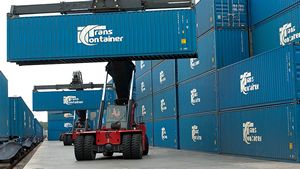
On May 21, the annual general meeting of shareholders of "TransContainer" PJSC, where the new board of directors was elected, took place. Deputy Chief of the Center for Corporate Transport Services (CCTS), Alexander Khatyanov, replaced the first deputy head of CCST of the Russian Railways, Sergey Tugarinov. The rest of the board of directors of the company, which includes 11 people, remained unchanged. It consists of Deputy General Director of Russian Railways, Andrei Starkov, Sergey Ludin (Managing Director of Invest AG), David Davidovich (Deputy Director General of "Millhouse" Ltd.), Lea Verni (Chairman of the Board of Directors of Zoltav Resources), Maxim Gavrilenko (Vice President of "CRS Investment Advisers" Ltd.), Evgeny Zaltsman (Managing Partner, Inventure Partners). The board of directors also includes advisor to the general director of Russian Railways, Alexei Taicher, head of the central directorate for managing the terminal and warehouse complex of Russian Railways, Alexei Belsky, head of the security department of Russian Railways, Viktor Shendrik and head of the economy department of Russian Railways, Vladimir Gaponko. | |
| IX International Forum "Transport Security" | 22.05.2019 |
|
On May 30-31, 2019, the IX International Transport Security Forum will be held in St. Petersburg. The event will be held with the support and participation of the State Duma of the Federal Assembly of the Russian Federation, the Ministry of Transport of the Russian Federation, the Ministry of Internal Affairs of Russia, the Russian Emergencies Ministry, the Federal Security Service of Russia and other relevant federal and regional authorities, commercial and public organizations. Representatives of IDGCA are permanent participants of this interesting and very useful forum, which discusses issues related to transport safety, including the carriage of dangerous goods. | |
| The International Maritime Organization (IMO) has been granted observer status at the Arctic Council | 22.05.2019 |
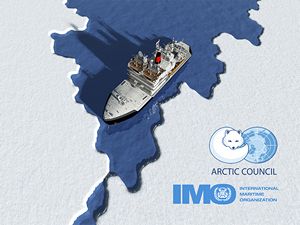
The International Maritime Organization (IMO) has been granted observer status at the Arctic Council. This will allow IMO to build on previous cooperation with the Arctic Council and engage in close collaboration on a range issues related to shipping in the Arctic, in particular, search and rescue, pollution response and maritime safety and protection of the marine environment. IMO has adopted the Polar Code , which provides mandatory requirements for ships operating in the harsh environment of the Polar regions, to provide additional protection on top of existing mandatory rules, for ship design, construction, equipment, operational, training, search and rescue and environmental protection matters. IMO is currently developing develop measures to reduce the risks of use and carriage of heavy fuel oil as fuel by ships in Arctic waters. IMO's "Guide on Oil Spill Response in Ice and Snow Conditions", approved in 2016, was developed in coordination with the Arctic Council's Emergency Prevention, Preparedness and Response (EPPR) Working Group. The Arctic Council is an intergovernmental organization which promotes greater coordination and cooperation among the Arctic States, among other things. The members of the Arctic Council are Canada, Denmark, Finland, Iceland, Norway, the Russian Federation, Sweden and the United States. | |
| Dmitry Zverev appointed new State Secretary of the Ministry of Transport | 16.05.2019 |
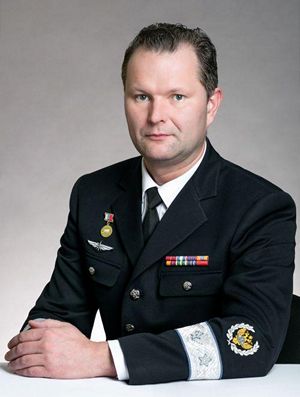
On March 21, 2019, Prime Minister Dmitry Medvedev signed a decree appointing Dmitry Zverev as Secretary of State - Deputy Minister of Transport of the Russian Federation. Earlier, Dmitry Zverev worked at the branch of the Scientific Research Institute of Air Navigation of the "State Research Institute of Civil Aviation" Federal State Unitary Enterprise, and also served as Deputy Federal Medical-Biological Agency. Recall that earlier the position of State Secretary was held by Sergei Aristov, he passed away in December last year. | |
Business does not wish to live according to unwritten rules. | 10.04.2019 |
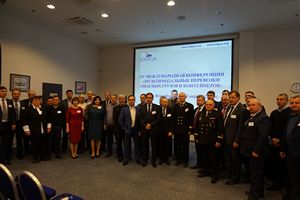 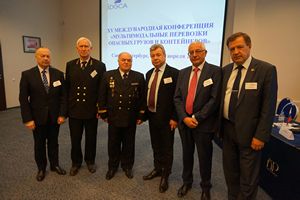 During April 4-5th, 2019, XV International conference was held in Peterhof, devoted to transport of dangerous goods by various types of transport. The conference organizer was IDGCA, its operator – International Staff Training Center (ISTC). Goals and tasks, which the conference organizer initiated in Peterhof, were not traditional. Main task was not only bring to audience understanding of requirements of international conventions and agreements concerning transport of dangerous goods, but also to generalize positive and negative practice of application on Russian territory of international conventions and agreements concerning transport of dangerous goods; to analyze reasons of artificially created administrative barriers, cases of unfair competition and abuse of rights. According to opinion of organizers, participants and guests, the conference attained its goals, experts in their reports made review of international rules concerning transport of dangerous goods, estimated forthcoming changes in rules and their harmonization. Representatives of scientific organizations brought audience’s attention to special conditions for transport of goods of the first and seventh classes of hazard, and to requirements for transport means and transport equipment. Interesting reports were made on theme of preparation for transport of cryogenic liquids, including helium in tank containers. The theme, concerning transshipment of liquefied natural gases on maritime terminals, was highlighted by representatives of the factory, producing liquefied gas, located in the town of Vysotsk, Leningrad region. Legislation requirements towards such complex and hazardous facilities revealed the representative of expert organization. Chief of Anticorruption Committee at Moscow Trade and Industry Chamber revealed to the conference participants the activities of his organization and confirmed his readiness to help business, when cases of rights violation arise after actions of unfair public officers. Íå also presented to the audience on tasks, which were assigned by President of Russian Federation, Vladimir Putin, regarding prevention of corrupt practices, and expressed his readiness to carry out anticorruption expertise of documents, when elements of corruption appear. Rather emotionally, with definite grade of resentment made his speech representative of Far East region. In his report he informed the audience about cases of power usurpations, admitted in Far East region in the sphere of transport of dangerous goods, which was supervised by former director of Department of state policy in maritime and river transport V.V. Kluev. The above reporter also told about attempts of organizations, subordinated to his Department, to push fuel in flexi-tanks for maritime shipping, despite international and national operating procedures. Such maritime shipping could represent danger for environment and safety of navigation. Certificates on flexi-tanks were issued by FAU "RMRS" on basis of testing carried out by "Maritime Cargo Bureau" LLC, though it is impossible to carry out such testing in accordance with Rules for transport of dangerous goods. The conference participants got surprised by the fact that manufacturer of soft containers weighing 24 tones, designed for maritime shipping of fuel, was nominally the company which delivers chicken leg quarters. The conference participants reviewed documents which testify wrongdoings of separate public civil servants, which led to detention of Russian export freights and vessels. The conference brought attention to institutional regulatory acts, which intentionally created preconditions for illegal detention of vessels, occupied in transport dangerous goods and cargoes, arriving to port and departing from port, as well as preconditions for corruption. Upon results of the conference work, resolution and appeal to Directorship of Russian Federation has been prepared. The conference organizers express their grand gratitude to all participants who arrived from numerous Russian cities, to IDGCA President, Vice-Admiral Moshkov G.Y., representatives of state authorities, Mr. Olivier Kervella, UN representative of TDG Sub-Committee of Experts and all whose, who openly expressed their position and contributed to development of honest, safe and economically efficient business in Russia related to transport of dangerous goods by all types of transport. During two days, in the conference work participated over 70 persons from different organizations, and all unanimously supported IDGCA activities, directed to honest business protection. | |
See you in Petergof | 05.03.2019 |
|
Efficiency of the state’s economic development mostly depends from existing system of technical regulation. Application of demands of International Agreements, Conventions, Codes on the country’s territory should be covered by special Government’s attention. Realization of International agreements is as a rule delegated to competent authorities, appointed by Government. Competent authority on transport in Russian Federation is Ministry of transport of RF. Realization of demands of international agreements in one country territory calls the authorities to be both delicate and competent. In particular, application of International Maritime Code for Dangerous Goods in the territory of Russia turned out to be not easy proofing for Russian business. How to avoid possible shocks occurred with application of international rules in one state territory? How to create open, transparent and understandable system of technical regulation which would combine international and national laws? How to tie up freedom of enterprise with necessary safety norms? You can receive answers to these and other questions, important to business and authorities on the forthcoming international conference. Conference organizing committee invites to participate in this important event all those who is not indifferent to existing problems in the sphere of international and national technical regulation, who tends to make it perfect, in particular in the sphere of transport of dangerous goods. Conference Organizers consider that necessary condition for one state economic development is fair competition, technical and legal competence of business and authorities. We invite you to participate in our Event!   | |
Sulphur 2020 – cutting sulphur oxide emissions | 27.02.2019 |
|
The main type of "bunker" oil for ships is heavy fuel oil, derived as a residue from crude oil distillation. Crude oil contains sulphur which, following combustion in the engine, ends up in ship emissions. Sulphur oxides (SOx) are known to be harmful to human health, causing respiratory symptoms and lung disease. In the atmosphere, SOx can lead to acid rain, which can harm crops, forests and aquatic species, and contributes to the acidification of the oceans. Limiting SOx emissions from ships will improve air quality and protects the environment. What is the current regulation on SOx in ships emissions and by how much is that going to be improved? We are going to see a substantial cut: to 0.50% m/m (mass by mass) from 3.50% m/m. For ships operating outside designated emission control areas the current limit for sulphur content of ships’ fuel oil is 3.50% m/m. The new limit will be 0.50% m/m which will apply on and after 1 January 2020. What must ships do to meet the new IMO regulations? IMO is working with Member States as well as industry (including the shipping industry and the bunker supply and refining industry) to identify and mitigate transitional issues so that ships may meet the new requirement. Source:www.imo.org | |
New terms may lead to a new mess in the transport of dangerous goods | 22.02.2019 |
|
On February 20, 2019 PortNews portal published an interview with the Director General of Marine Cargo Bureau Ltd., Alexander Sitov. IDGCA NP experts, as well as other readers, distinguishing the tare from the vessel, were puzzled by the presentation of the "New requirements for the tare and equipment for ensuring fire safety of transport operations with dangerous goods".Indeed, the article by Alexander Sitov provides paradoxical conclusions, when the rules concerning the hull and equipment of sea vessels will apply to containers and packaging intended for the transport of dangerous goods by various modes of transport. We quote only one text fragment from the article: "The introduction of the term and its corresponding requirements into the Rules will allow for the practical implementation of new means and methods for extinguishing fires in confined spaces at the stage of their occurrence," said Alexander Sitov. What new means and methods of fire extinguishing in confined spaces is the author talking about? And what has that to do with the provision of fire safety of transport operations. Also, it seems, the author is not familiar with the classes and subclasses of dangerous goods. And the term "fire-safe/fireproof packaging" is a real nonsense.It makes no sense to comment on the whole the article, since it represents a set of terms, definitions and fantasies that are not related to each other. Obviously, the author somewhere picked up the idea of creating a transport unit with an autonomous fire extinguishing system, designed to transport dangerous goods. This idea was indeed articulated by IDGCA NP in the International Maritime Organization and the UN Sub-Committee of Experts 10 years ago. One can imagine what kind of document these great figures can prepare in IMO. It may be even more absurd than the one that was prepared last year. God forbid, if in a year or three, as the author says, new terms, similar to those announced by Mr. Sitov, will appear in the Rules. | |
Information about the meeting of the informal working group on tank inspection and certification | 19.02.2019 |
 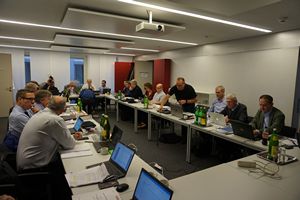 On January 24-25, 2019 a regular meeting of the informal working group on tank inspection and certification was held in Vienna, in the building of the Chamber of Commerce and Industry of Austria. The meeting was chaired by the representative of the British Ministry of Transport, Steve Gilingham. The meeting was attended by delegates from Germany, France, Poland, Finland, as well as representatives of the European Union and non-governmental organizations, including IDGCA NP. The meeting discussed the fundamental principles of changing chapter 6.2, chapter. 6.8 of RID, ADR in terms of administrative control, approval and inspection of tanks. The discussion also included the issue of mutual recognition of the results of approval and inspection carried out on behalf of the competent authorities of various states. A detailed consideration was given to changes in the text of chapter 6.2 and chapter 6.8, including paragraphs 1.8.6 and 1.8.7 of chapter 6.8. Attention was paid to the possibility of applying national standards in the manufacture of tanks. Following the meeting, proposals were prepared for the Joint Meeting of Experts of the RID Committee and the Working Group of Experts on the Transport of Dangerous Goods of the UNECE Sub-Committee, which will take place in Bern on March 18-22, 2019. | |
Dangerous goods: new transportation requirements | 18.02.2019 |
|
More than three months, a batch of calcium carbide, intended for shipment to Sakhalin, was under the sanctions by the port authorities of Vladivostok and was not allowed to be loaded onto the vessel. The cargo belonged to the company TEK "Garant-Container" Ltd. The arguments and submitted transport documents, testifying to the compliance of the cargo with the requirements of IMDG Code and national regulatory requirements, were not accepted by the port authorities. The wording of the refusal to transportation was given in various interpretations and with reference to non-existent legal acts. However, all the arguments boiled down to the need to replace the certificate for the tare issued by CNIIMF JSC with the certificate issued by the RMRS FAI. The most "simple" solution that, after the appeal of TEK "Garant-Container" Ltd., was offered to the cargo owner was to reload the calcium carbide from the tare certified by CNIIMF JSC into the tare certified by the RMRS FAI. Advisors, who called themselves no more or less as a "competent authority", did not even suspect that such reloading in the port was extremely dangerous and, in principle, impossible. In all likelihood, they did not take into account the fact that calcium carbide, UN ¹ 1402, belongs to Hazard Division 4.3 - Substances that emit flammable gases when in contact with water; and as we know, moisture in the seaport is sufficiently high. In January 2019, the port authorities of Vladivostok decided to arrange a "scathing rebuke" for the shipper and cargo owner: first they allowed loading onto the vessel without a certificate from RMRS FAI, then, when the vessel laid out, they started an unscheduled check and requested test reports for the tare for the above cargo. The absence of these test reports on the vessel caused a stoppage not only for the cargo, but also for the vessel, which, according to the information of the shipper, was had to return to the port and unload the container with the cargo. Today good news came from the Far East: the container with calcium carbide was loaded onto a ship and the ship went to Sakhalin. What was the reason for this decision is not yet clear. Perhaps numerous appeals of the cargo owner to all instances, taking of measures by the new leadership of the Ministry of Transport of the Russian Federation and the appeal of the State Duma Deputy to the Governor of Primorsky Krai, Oleg Nikolayevich Kozhemyako, had their effect. A great many believe that the "sanctions" against the Russian container owner were introduced on the initiative of V. Klyuev (former director of the Department of State Policy in the field of sea and river transport of the Ministry of Transport of the Russian Federation). According to the available information, he was the initiator of the "General rules for navigation and anchorage in the seaports of the Russian Federation and on the approaches to them" approved by Order of the Ministry of Transport of the Russian Federation ¹ 463 dated October 26, 2017. The requirements on the mandatory availability of tare test reports on-board a vessel were imperceptibly introduced in paragraph 121 of the General rules. However, according to article 25 of the Merchant Shipping Code of the Russian Federation and Appendix ¹ 3 "List of documents to be checked during inspection of vessel", in contradistinction to what is stated in the "General rules for navigation and anchorage of ships in seaports of the Russian Federation and on approaches to them", tare test reports are not mandatory documents onboard a vessel.The above requirements are not provided for by any national and international rules and are absolutely absurd from the point of view of safety and common sense. But if we consider the interests of affiliated companies, the absence of tare test reports or non-compliance of these reports to any pattern will allow them to stop vessels, conduct additional paid checks of vessels and cargo and send shippers to get "correct test reports", for example, to Marine Cargo Bureau Ltd., which unexpectedly became an "exclusive testing laboratory", which according to official statistics in 2018 employed only 2 people. Do we need new requirements to tremble Russian business, how to overcome unnecessary administrative barriers, how to make the transport of dangerous goods safe? All this will be discussed at the upcoming XV International Conference "Multimodal Transportation of Dangerous Goods" on April 4-5, 2019. | |
IMO Circular can become an instrument of unfair competition | 07.02.2019 |
|
International conventions, codes and standards are national wealth for the states which have ratified international documents and created a transparent and effective mechanism for implementation of the provisions of these international rules. International institutions which develop conventions, agreements, standards, etc. (such as UN, IMO, ISO, etc.), establish procedures that allow each state to have an adequate period of time to prepare national laws, to translate the texts on national languages, to carry out trainings and other necessary procedures to ensure a smooth transition of the economy and business to the new rules before their entry into force. As a rule, Governments assign the obligations for the implementation of international treaties to Administrations. If Administrations do not fulfill their obligations, entry of international agreements into force can lead to extremely negative consequences for business and authorities. Sometimes officials exercising their authority to implement the provisions of international conventions use their position as an instrument of unfair competition and thereby create obstacles to the development of the state’s economy. These and other issues will be widely discussed at the upcoming XV International Conference "Multimodal Transportation of Dangerous Goods", where business and government representatives are invited. Special attention will be paid to recent events related to the implementation of the provisions of the International Maritime Dangerous Goods Code (IMDGC) and the European Agreement concerning the International Carriage of Dangerous Goods by Road (ADR). | |
Last respects to Sergey Aristov | 02.01.2019 |

Today in Moscow they pay last respects to State Secretary, Deputy Minister of Transport, Sergey Alekseyevich Aristov. The news of the premature death struck painfully on the hearts of all the people who knew him well in life and work. IDGCA NP heads, on their own behalf and on behalf of their Partners, sincerely extend condolences to relatives, friends and colleagues of Sergey Aristov.Sergey Alekseevich has always supported the activities of IDGCA NP and promoted the development of the association. In April 2014, at the initiative of Sergey Alekseevich, an agreement on cooperation between the Ministry of Transport of the Russian Federation and IDGCA NP was signed. The Management of IDGCA NP will always remember Sergey Alekseevich as a man of outstanding personality and highly professional leader. | |



